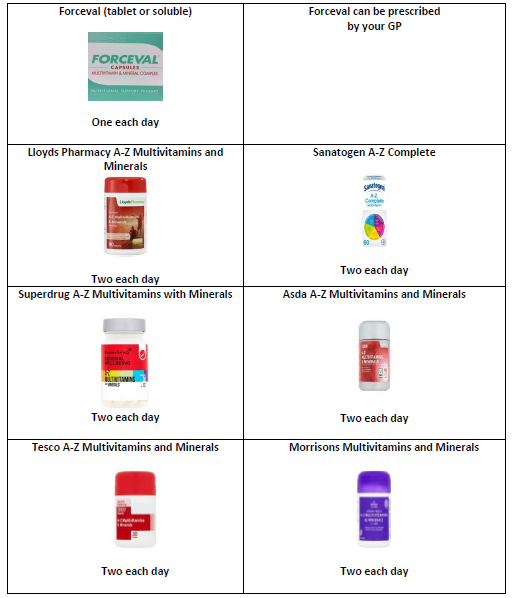Vitamin and Mineral Supplements after Gastric Bypass or Sleeve Gastrectomy
After your surgery
Multivitamin and Mineral supplements are mandatory for life after you have had a gastric bypass or sleeve gastrectomy.
Some multivitamins and minerals can be prescribed by your GP. Alternatively you can purchase some over the counter from pharmacies and supermarkets.
After surgery the quantity that you will be able to eat reduces and this combined with changes to your stomach and small intestine (that result in some mild malabsorption), will mean that you may not absorb sufficient vitamins and minerals. Daily vitamin and mineral supplements are essential to reduce the risk of any deficiencies and keep you well.
You will need the following:
A complete A-Z multivitamin and mineral formula – daily
Begin to take your multivitamin and mineral as soon as possible after surgery. You will be given a soluble formula (for 1 month) when you are discharged from hospital. After this your GP can prescribe you with tablets. Take your supplement with or after food to reduce the risk of side effects such as nausea.
Calcium and Vitamin D (combined) formula – 1200-1500mg/daily from food and supplements
Calcium is an essential mineral for your bone health, cell and muscle function, and is better absorbed with the presence of vitamin D.
Taking calcium and iron together can interfere with the others absorption, so take these supplements at separate times across the day, leaving at least a 2 hour gap between them.
An iron supplement – daily for women of menstrual age (or if you have anaemia)
Iron is essential for the formation of red blood cells that carry oxygen around the body. Iron deficiency can cause anaemia and symptoms include; fatigue, palpitations, pale skin, hair loss and a sore mouth.
Taking iron and calcium together can interfere with the others absorption, so take these supplements at separate times across the day, leaving at least a 2 hour gap between them.
A separate Vitamin D3 (in addition to calcium/Vitamin D combined supplement) – 20,000IU once each week (or 2,000-4,000IU daily)
Vitamin D helps regulate the amount of calcium and phosphate in the body. It helps to keep bones, teeth and muscles healthy. In adults Vitamin D deficiency can lead to bone pain caused by a condition called Osteomalacia in adults.
B12 (Hydroxycobalamin) 1mg intramuscular injection - every 3 months
Vitamin B12 is involved in helping the body make red blood cells and keeps the nervous system healthy. The changes to your stomach and small intestine after bariatric surgery can affect your absorption of B12.
Deficiency may result in fatigue, weakness, a sore, red tongue or mouth ulcers. More serious consequences of deficiency include; pins and needles, disturbed vision, depression, confusion, and problems with memory.
Take all of your vitamins and mineral every day but do not take them all together. Spread them evenly across the day to help your body absorb them.
Here is an example:

Paying for your prescriptions
If you are not eligible for free prescriptions, then you could consider a pre- payment certificate (PPC) to help with the costs of your supplements (and medications).
You can purchase this 3 monthly or yearly. For further information visit: https://www.nhsbsa.nhs.uk/help-nhs-prescription-costs/prescription-prepayment-certificates-ppcs
Below are lists of suitable multivitamins and minerals, some of which can be prescribed by your GP or alternatively purchased from pharmacies or online.
Suitable A-Z Vitamins and Minerals

Suitable Calcium (with Vitamin D) supplements

Suitable Iron supplements

Suitable Vitamin D supplements

Baricol Complete

Thiamine
If you experience prolonged vomiting and/or poor dietary intake or excessive weight loss, then contact your dietitian or GP as you may require additional supplements of Thiamine and Vitamin B Co strong. These B Vitamins are not usually stored in the body so levels can become quickly depleted.
Symptoms of thiamine deficiency include; confusion, neuropathy (damage to the nerves), poor coordination (stumbling, falling), slurred speech and a rapid heart rate (tachycardia).
Bariatric Dietitians: 0203 315 8161

